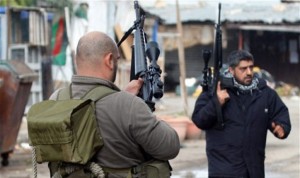 Foreign-backed militants operating in Syria (file photo)[/caption]
Foreign-backed militants operating in Syria (file photo)[/caption]Iran�s presidential advisor for cultural affairs Hessamoddin Ashena�has warned that the �organized terrorism� in Syria may spread to regional and even European countries.
�What exists in Syria now is organized terrorism and if terrorism is not squashed in the country, this issue will spill over to regional countries and even to Europe,� Ashena said.
He made the remarks in a meeting with the Chairman of Kazakh Parliament�s Committee on International Affairs, Defense and Security, Maulen Ashimbayev, in Tehran on Monday.
Iran and Kazakhstan have common and logical concern about Syria and terrorism in the country, he added.
Syria has been gripped by deadly unrest since 2011. Reports indicate that the Western powers and their regional allies -- especially Qatar, Saudi Arabia, and Turkey -- are supporting the militants operating inside the country.
According to the United Nations, more than 100,000 people have been killed and millions displaced in the violence. On October 7, the UN said over four million other Syrians will be forced out of their homes in 2014 due to the escalating conflict in the country.
Two million Syrians are expected to take refuge outside the country while another 2.25 million are predicted to be internally displaced next year.
The Iranian official further pointed to �growing and historical� relations between Iran and Kazakhstan and said Iran�s foreign policy gives priority to the expansion of ties with neighboring and regional countries.
He added that the intervention of foreign powers in the legal regime of the Caspian Sea would be detrimental to all regional countries.
�The Islamic Republic of Iran is concerned about the impact of foreign interference on the trend of talks and the improvement of ties among regional countries,� Ashena stated.
The Caspian Sea is the largest enclosed body of water on earth by area, and is variously classed as the world's largest lake or a full-fledged sea.
The maritime and seabed boundaries of the Caspian Sea have yet to be demarcated among the five countries bordering the sea. Despite extensive negotiations, the legal status of the Caspian Sea has been unclear since the break-up of the Soviet Union in 1991.
Currently, the Caspian Sea's legal regime is based on two agreements signed between Iran and the former Soviet Union in 1921 and 1940.
The littoral states have yet to come up with a final convention on the Caspian Sea, which will determine their territorial rights as well as other matters related to the sea.
The Kazakh official, for his part, said Astana supports further expansion of ties with Iran in various fields, particularly in the economic and political sectors.
Kazakhstan believes that all countries including Iran have the right to use nuclear energy for peaceful purposes, Ashimbayev added.
The United States, Israel and some of their allies have repeatedly accused Iran of pursuing non-civilian objectives in its nuclear energy program. Iran has categorically rejected the allegation.
By Press TV
The Iran Project is not responsible for the content of quoted articles.










